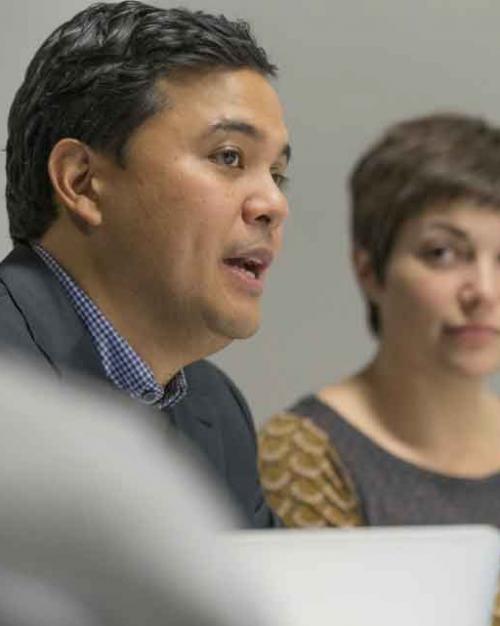The Technology and Law Colloquium – a hybrid Cornell University course and public lecture series – will return this semester with talks from 13 leading scholars who study the legal and ethical questions surrounding technology’s impact in areas like privacy, sex and gender, data collection, and policing.
The lectures will take place throughout the Fall semester at 1:30 p.m. (EST) on Fridays in Statler Hall, unless otherwise noted. Though in-person attendance is limited to only students enrolled in the course, lectures can be attended virtually via Zoom, and most talks will be recorded and made available at the Colloquium website.
Kate Klonick, a law professor at St. John’s University who researches speech, privacy, and online platforms, will kick off the Fall slate on Friday, September 3.
“It’s impossible to not acknowledge the role platforms and artificial intelligence play in everyday life in big and little ways, from vaccine misinformation to autonomous vehicles. Our students almost universally acknowledge the need to think seriously about ethics in technology,” said Karen Levy, an assistant professor in the Department of Information Science, associate faculty member at the Cornell Law School, and the course’s instructor. “Simply acknowledging and calling out problems of bias in algorithms or the existence of privacy invasions used to be considered a step forward. Now the questions are: What do we do about it? How can we make accountable decisions and balance between different policy goals? How do we make sure people are not harmed? These aren’t exclusively technology questions.”
Now in its third iteration, the Tech/Law Colloquium – or INFO 4113/6113/LAW 7113 – is a joint collaboration between Cornell University’s Department of Information Science within the Ann S. Bowers College of Computing and Information Science and the Cornell Law School. It was launched in 2017 with the goal of educating students on the ways technology and innovation can, and have, run afoul on civil rights – intentionally or unintentionally – while addressing relevant questions on matters of ethics and law.
The semester schedule is available at tlc.cis.cornell.edu.
Among this semester’s colloquium speakers are:
- Danielle Citron, Jefferson Scholars Foundation Schenck Distinguished Professor at the University of Virginia School of Law, teaches and writes about information privacy, free expression, and civil rights, and is the author of “Hate Crimes in Cyberspace.”
- Stephen Hilgartner, professor in the Department of Science and Technology Studies at Cornell University, researches on situations in which scientific knowledge is implicated in establishing, contesting, and maintaining social order. He currently co-leads the Comparative Covid Response project (or CompCoRe), a multi-national research project investigating policy responses to the Covid-19 pandemic.
- Sarah Lamdan, professor at CUNY School of Law in Long Island City, NY, focuses on information law and policy and data justice, from open government to personal privacy. She is currently writing a book about data control and access called Data Cartels.
- Ngozi Okidegbe, assistant professor at Cardozo School of Law, researches and writes in the areas of criminal procedure, evidence, technology, and racial justice.
Following each talk in Statler Hall, the roughly 60 students enrolled in the colloquium course will participate in an in-depth workshop with the colloquium speaker. This dialogue with the presenter, Levy said, offers students a unique perspective into the research-development process.
“I want students to understand how fundamentally difficult these problems are. There’s often not an obvious “good guy” or “bad guy,” and no easy fixes—and we do students a disservice if we frame things that way. There are difficult tradeoffs,” Levy said. “I want students to come away with the understanding of how complex these problems are, and how much they affect our everyday lives.”
The Tech/Law Colloquium is supported by the Department of Information Science, Cornell Law School, and the MacArthur Foundation.
Read the story in the Cornell Chronicle.




